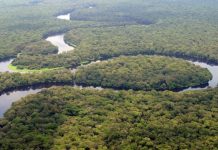The Cost of the Hottest Year in History: Climate Disasters of 2024
As we bid farewell to 2024, it’s impossible to ignore the unprecedented toll that climate change has taken on our world. This year marked...
742 New Species Discovered in the Congo Basin
In the heart of Africa lies the Congo Basin, one of the most ecologically vibrant regions on the planet. Over the past decade, in...
Deforestation Threatens Oluwa Forest Reserve: Need for Urgent Action
The Oluwa Forest Reserve in Ondo State, Nigeria, established in 1918, is facing unprecedented challenges from deforestation, which threatens its rich biodiversity and ecological...
COP29: A Crucial Step Toward Climate Action and Financial Reform
As the 29th Conference of the Parties (COP29) to the United Nations Framework Convention on Climate Change (UNFCCC) convenes in Baku, Azerbaijan, world leaders...
Celebrating Nature and Eco-Friendly Transportation: An Overview of World Migratory Bird Day, and Ride...
October is a month to reconnect with nature. This year, we embraced two meaningful celebrations: World Migratory Bird Day, and Ride to Work Day....
World Food Day 2024: Right to Foods for a Sustainable Future
World Food Day, observed annually on October 16, is a global event aimed at combating hunger. First established in 1979 by the Food and...
World Animal Day 2024: Celebrating the Creatures We Share Our World With
October 4th is observed worldwide as World Animal Day, a day dedicated to raising awareness about the suffering of animals. This year’s theme, "The...
Hippopotamus Kills 60-Year-Old Guard in Kebbi
In a tragic incident on Sunday, a 60-year-old man, Malam Usman Maigadi, was killed by a hippopotamus while fishing in the Yauri River, Kebbi...
Zero Emissions Day 2024: Give Our Planet One Day Off a Year
On September 21st, we celebrate Zero Emissions Day, a global effort to give our planet a much-needed break. This year's theme, "Give our planet...
Celebrating the 2024 International Day for the Preservation of the Ozone Layer
Tomorrow, September 16, the world will once again come together to celebrate the International Day for the Preservation of the Ozone Layer. Proclaimed by...





























